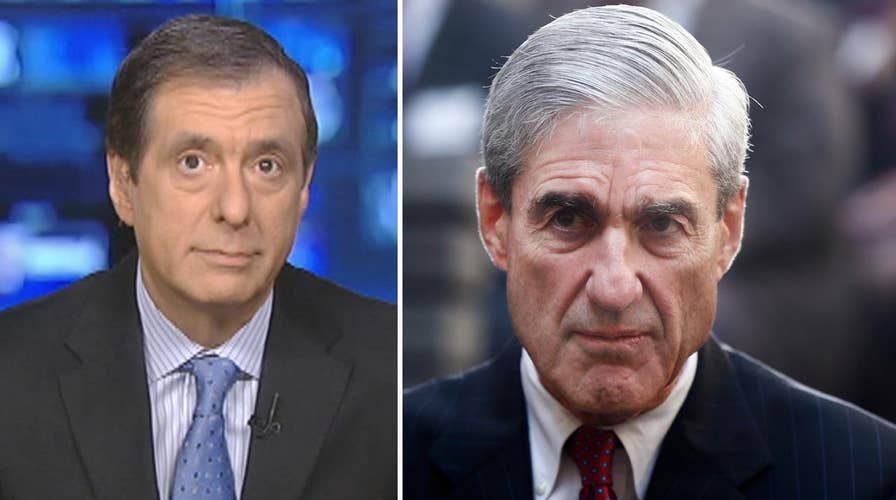Howard Kurtz: Will press engage in soul-searching despite no collusion? Probably not
'MediaBuzz' host Howard Kurtz weighs in on the aftermath of the Mueller report clearing President Trump of collusion claims.
Now that President Trump’s repeated claims of “no collusion” between his campaign and Russia have been supported by Special Counsel Robert Mueller, the president called Friday for The New York Times and Washington Post to lose Pulitzer Prizes they received for stories on the collusion allegation.
The president tweeted: “So funny that The New York Times & The Washington Post got a Pulitzer Prize for their coverage (100% NEGATIVE and FAKE!) of Collusion with Russia - And there was No Collusion! So, they were either duped or corrupt? In any event, their prizes should be taken away by the Committee!”
A summary of Mueller’s findings, released last Sunday by Attorney General William Barr, said: “The Special Counsel’s investigation did not find that the Trump campaign or anyone associated with it conspired or coordinated with Russia in its efforts to influence the 2016 U.S. presidential election.”
MARC THIESSEN: THE TRUMP-RUSSIA COLLUSION HALL OF SHAME
That certainly throws cold water on the predominant narrative in much of the media that the Trump campaign worked with Russia to put Trump in the Oval Office.
Columbia University’s Graduate School of Journalism awarded the 2018 Pulitzer Prize for national reporting to The Washington Post and New York Times last April for their work on the Trump-Russia story.
That same month I witnessed how delighted my former Columbia classmates were about the prospect of Trump’s impeachment. The occasion was an alumni panel discussion titled “A Year of Trump: Lessons for the Press.
But this should be a moment of honesty and introspection for journalists – and an admission that they make mistakes and let their biases influence their work.
The panel discussion at Columbia came the day after North Korean dictator Kim Jong Un announced he would suspend nuclear and missile tests and shut the site where the North’s previous six nuclear tests were conducted. Kim made the announcement in response to a historic diplomatic initiative by President Trump.
No one knew what would happen next, but it should have been obvious to anyone – even someone who had never taken a single high school journalism class – that this was major development and big news.
Journalism School Dean Steve Coll asked the alumni panelists – including New York Times Washington Bureau Chief Elisabeth Bumiller, Wall Street Journal investigative reporter Michael Rothfeld, and Boston Herald Chief Washington Reporter Kimberly Atkins – to list the biggest news stories of the week.
The group rated the top stories as being the continuing Mueller probe, the legal troubles of former Trump attorney Michael Cohen, and the long-running claims of adult film actress Stormy Daniels alleging she had a consensual one-night stand with Trump years ago. Trump has denied having an affair with Daniels and denied any wrongdoing regarding payments she received to stay silent about her claim.
I looked around the third floor Jamail Lecture Hall to make sure I was in the right place. What happened next was appalling.
For about 90 minutes, Coll, the panelists and audience salivated over speculation about when Mueller would release his report and how soon afterward the House of Representatives could start impeachment proceedings against Trump. There was no pretense of objectivity. There was only a room full of anti-Trumpers who indulged each other with the fantasy of the president’s impending demise.
The clear assumption by most speakers was that President Trump was guilty until proven innocent. Most obviously believed the collusion charge was accurate.
Not once did anyone hint at even the possibility that there was no collusion between the Trump campaign and Russia.
For someone like me, who never believed the Russia collusion story, it was tough to watch. Even more insulting were the dismissive references to Trump supporters as “people who don’t read East Coast newspapers,” or “those people from the belly of the country.”
This unintellectual mob had turned the discussion into something that should have been titled “Getting Rid of Trump in Any Way Possible.”
And when news of the diplomatic effort in North Korea failed to make it to the Columbia Journalism School’s news topics that day, I almost got up and walked out.
This year’s alumni lecture is called “Election Coverage 2020: How to Avoid a Repeat of 2016,” and in addition to Coll and Bumiller, Buzzfeed’s Tom Namako and NBC’s Morgan Radford are slated to join the panel in April.
Let’s hope it’s a more intellectual and balanced discussion of how their bias caused them to miss the biggest story of the decade.
Don’t look for the Columbia Journalism School to take back the Pulitzer Prizes awarded to The New York Times and Washington Post. That would be expecting too much.
But this should be a moment of honesty and introspection for journalists – and an admission that they make mistakes and let their biases influence their work. They need to admit they inaccurately reported on the 2016 election and the fake Russia-collusion story. They need to apologize to the American people for deceiving them.
CLICK HERE TO GET THE FOX NEWS APP
The best-case scenario would be for Trump-hating journalists to acknowledge their bias and deception, and pledge to report more fairly.
I have my doubts, though. Many in the media seem more interested in focusing on how to prevent President Trump from being re-elected in 2020.





















